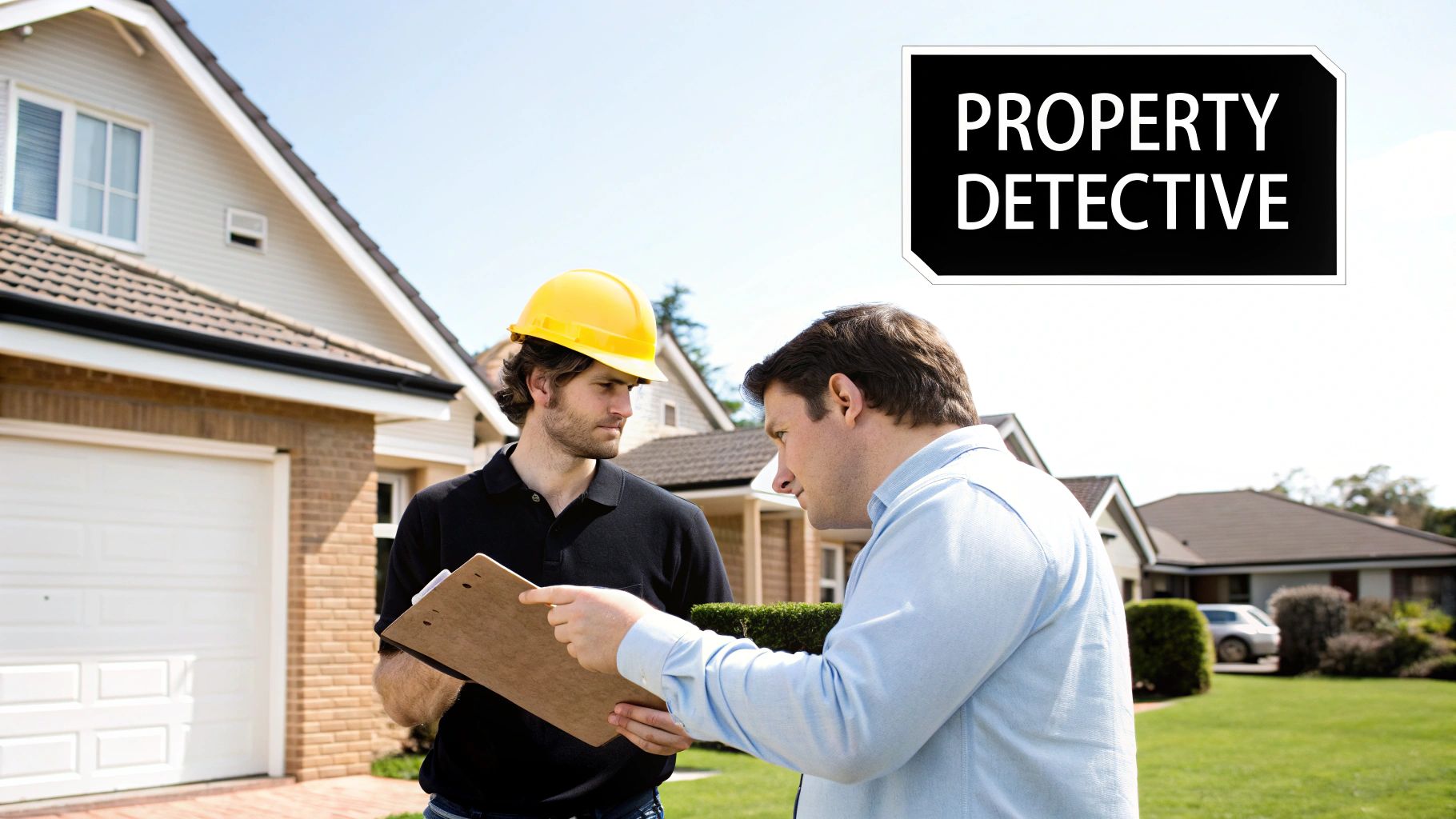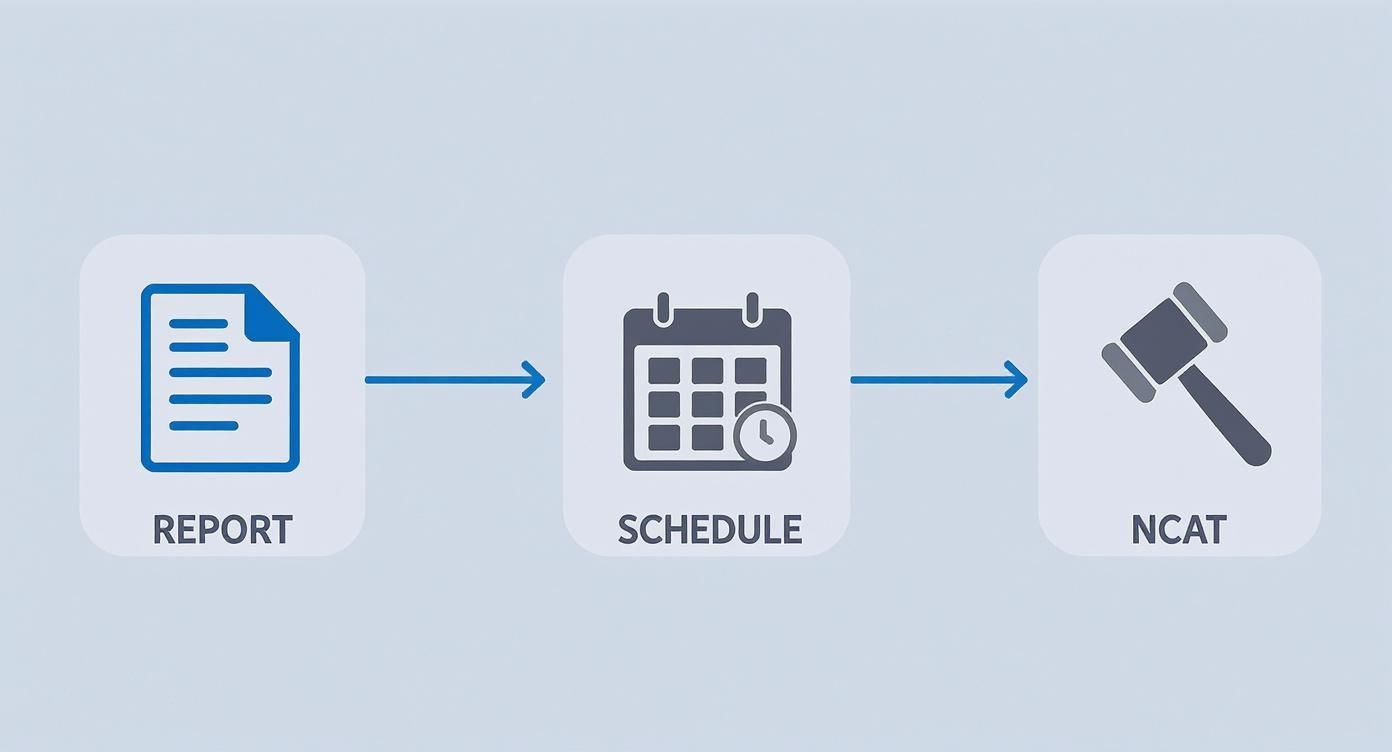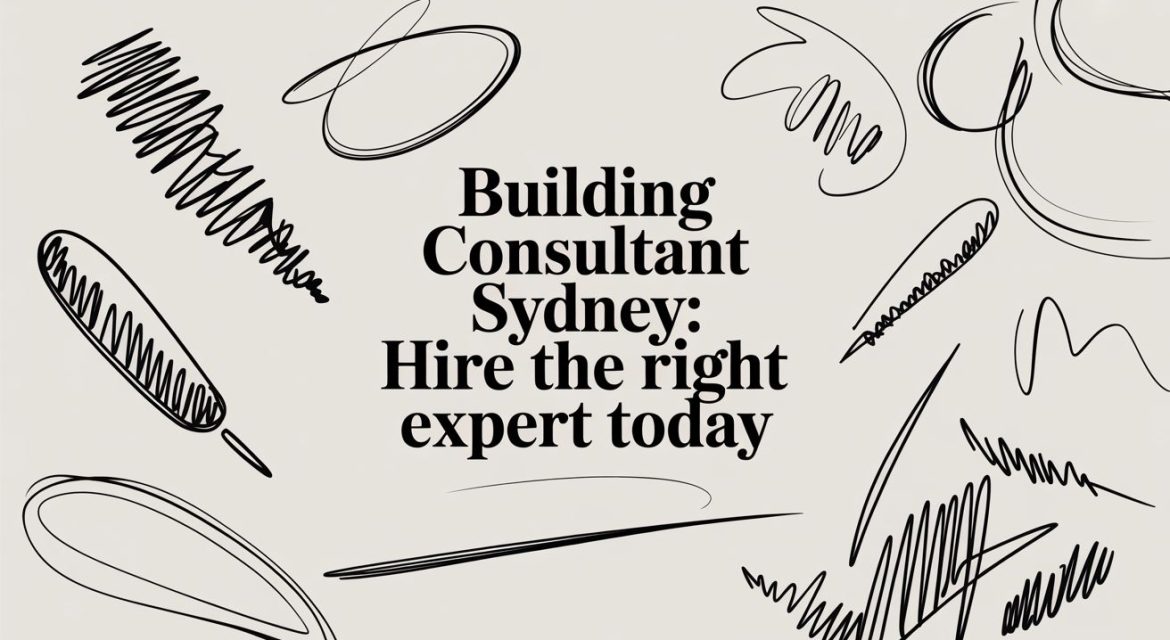Think of a building consultant in Sydney as the expert you bring in when a building problem gets serious. They’re not just another inspector; they’re specialists who cut through the confusion of construction defects, disputes, and complex issues to give you clarity and a way forward.
They are your independent expert, tasked with translating messy building problems into clear, actionable advice that stands up to scrutiny.
What Does a Building Consultant in Sydney Actually Do?

Imagine you’ve found a persistent leak that the builder swears isn’t their fault. Or maybe you’ve discovered worrying cracks in a brand-new wall, and now you’re locked in a frustrating stalemate.
These are the moments when a standard building inspection just won’t cut it. You need someone who can diagnose the root cause with forensic precision, document it meticulously, and produce a report that holds up in a legal setting like the NSW Civil and Administrative Tribunal (NCAT).
That’s exactly what a building consultant does. Their job is to provide an objective, evidence-based assessment of building work, defects, and compliance issues. While a contractor is focused on doing the work, a consultant is laser-focused on analysis, investigation, and reporting.
Do You Need a Building Consultant in Sydney?
Use this quick guide to see if your problem requires the expertise of a building consultant.
| Your Situation | Is a Consultant Needed? | Primary Service Required |
|---|---|---|
| My builder and I disagree on the quality of the final finishes. | Yes | Defect Inspection & Report |
| I’m buying a house and need a general condition report. | No | Pre-Purchase Building Inspector |
| My dispute is heading to NCAT and I need formal evidence. | Yes | Expert Witness Report |
| I’m worried about a new crack and need to know if it’s serious. | Yes | Structural Defect Assessment |
| The builder won’t fix a persistent leak after multiple requests. | Yes | Defect Inspection & Scott Schedule |
If your situation falls into the ‘Yes’ column, engaging a professional is your next logical step.
Key Scenarios Requiring a Consultant
You’ll want to hire a building consultant when your situation moves beyond a simple repair or a minor disagreement. Their expertise becomes essential when:
- Persistent Defects Emerge: Problems keep showing up after the job is supposedly finished—think water ingress, structural cracking, or shoddy installations that your builder has failed to fix properly.
- Disputes Reach a Deadlock: You’ve hit a wall. Communication with your builder has broken down, and you need an independent, expert assessment to validate your claims before things escalate.
- Legal Evidence is Required: Your case is on the path to NCAT. This means you need a formal Expert Witness Report that is prepared to meet the tribunal’s strict rules and procedures.
- Quality of Work is Questionable: You have a strong gut feeling the work isn’t up to scratch. A consultant can provide an impartial evaluation to determine if the job meets the Building Code of Australia (BCA), relevant Australian Standards, and the terms of your contract.
With the total value of building work done in New South Wales hitting $39.04 billion in the year to June 2023, the scale and complexity of projects have skyrocketed—and so has the potential for disputes.
Differentiating Consultants from Inspectors
It’s a common point of confusion, but a building consultant and a pre-purchase inspector have very different roles. A pre-purchase inspector gives a potential buyer a broad, general overview of a property’s condition.
A building consultant, on the other hand, performs a forensic deep-dive into a specific—and often contentious—issue. They are brought in to help resolve problems, not just to find them. Their work often becomes the very foundation of a successful resolution in a building dispute.
Consultants are often the experts called in to investigate the kinds of critical structural failures that led to the devastating special levies for Mascot Tower and Opal Tower residents here in Sydney. Their detailed analysis is what’s needed to figure out who is liable and what scope of remedial work is required.
When you’re facing these kinds of challenges, understanding the specific role of a https://awesim.com.au/building-consultants/ is the first, most crucial step toward protecting your property and your investment.
Decoding the Services of a Building Consultant
When you bring a Sydney building consultant on board, you’re not just getting a quick look-over. You’re gaining access to a specialist’s toolkit, designed specifically to cut through the complexity of construction disputes. It’s vital to understand what these services are, as each one plays a unique role, especially when a disagreement is on the path to a formal hearing at NCAT.
Let’s get past the industry jargon. Think of these services less like a checklist and more like the specialised instruments a surgeon uses—each one is picked for a very specific and critical job.
At the heart of it all, a consultant’s job is to provide objective, factual evidence. Their reports aren’t just opinions; they’re built on a solid foundation of the Building Code of Australia, the relevant Australian Standards, and the fine print of your building contract.
Expert Witness Reports: The Foundation of Your Case
An Expert Witness Report is without a doubt the most powerful tool a consultant has. This isn’t your average defect list. It’s a formal, legally structured document crafted for one purpose: to be used as evidence in legal proceedings, most often at the NSW Civil and Administrative Tribunal (NCAT).
Picture this report as your star witness in a courtroom. It lays out the facts of your case with clarity and precision, minus the emotion. Its only job is to help the Tribunal understand the technical building issues that are at the core of the dispute.
A standard building inspection report just won’t cut it in this arena. An Expert Witness Report has to follow strict codes of conduct and formatting rules to even be considered as evidence. This is where a seasoned building consultant proves their worth. They know exactly how to frame the evidence to be both persuasive and compliant. For a homeowner caught in a dispute, this report is what turns a frustrating complaint into hard, actionable proof.
Scott Schedules: Clarifying Every Single Dispute Point
When you’re dealing with a long list of defects, conversations can easily get messy and go around in circles. This is where a Scott Schedule steps in to bring order to the chaos.
Think of a Scott Schedule as a detailed, organised spreadsheet for your dispute. It’s a document, usually a table, that lists every single alleged defect. For each item, it has columns for:
- The claimant (that’s you) to describe the problem.
- The respondent (the builder) to give their side of the story.
- The consultant to provide their expert, impartial opinion.
- The estimated cost to fix the issue.
This structured approach forces everyone to address each point directly, getting rid of vague arguments and the classic “he said, she said” drama. For NCAT, it’s a game-changer. It streamlines the hearing by laying out all the disputed items in a clear, easy-to-compare format. It cuts through the noise and zooms in on the facts of each defect, which is crucial for getting a fair result.
A well-prepared Scott Schedule is a powerful tool for resolution. By systematically documenting each defect and the associated costs, it often encourages a settlement before the matter even reaches a final hearing, saving both time and money.
NCAT Compliance: Speaking the Tribunal’s Language
Getting through the NCAT process isn’t just about having a legitimate complaint; you have to present your case in a way the Tribunal will actually accept. NCAT compliance isn’t a friendly suggestion—it’s a non-negotiable rule.
A consultant who specialises in NCAT disputes ensures that every piece of documentation, from the first report to the final Scott Schedule, follows the specific Procedural Directions of the Tribunal. This covers everything from correct formatting and language to sticking to the expert witness code of conduct.
Handing in a non-compliant report is like trying to pay for your groceries with a foreign currency—it simply won’t be accepted. Your evidence could be thrown out completely, leaving your case seriously weakened. An expert with real NCAT experience makes sure your evidence is not only solid but is also presented in the precise “language” the Tribunal requires.
While these services are crucial for disputes, the process always starts with a thorough investigation. You can see how a consultant meticulously documents building issues by understanding the process of independent building inspections, which lays the groundwork for these more formal reports. This foundational work is what gives every legal document that follows its undeniable authority.
How It Works: Your Step-by-Step Journey With a Consultant
Bringing in a building consultant for the first time can feel a bit daunting, but it’s actually a very logical and structured process. It’s designed to take the guesswork out of your situation and give you a clear path forward.
Think of it like hiring a specialist doctor for your property. You start with a consultation to diagnose the problem, move to a detailed examination, and finish with a clear, actionable treatment plan. Each step builds on the one before it.
Step 1: The First Call and Fee Proposal
It all starts with a phone call or an email. This is your chance to give the consultant a rundown of the issue you’re facing – whether it’s a nagging defect, a dispute with your builder, or the need for a formal expert opinion for a legal matter.
To make this first chat as productive as possible, try to have key documents handy. Things like your building contract, photos of the problem area, and any emails between you and the other party are incredibly helpful.
Based on this conversation, the consultant will put together a fee proposal. This isn’t just a quote. It’s a clear document that outlines exactly what they will investigate, the type of report you’ll receive (like a Defect Report or an NCAT-compliant Expert Witness Report), and the costs involved. This way, you know exactly what you’re getting before any work kicks off.
Step 2: The On-Site Inspection
Once you give the proposal the green light, the real work begins with the on-site inspection. This is where the consultant’s years of experience really shine. It’s a meticulous, hands-on investigation where they physically examine the alleged defects and assess the standard of the workmanship.
During the inspection, the consultant is laser-focused on gathering evidence. They will:
- Document Everything: Taking heaps of photos and detailed notes on every single issue.
- Use Specialised Tools: They might use moisture meters, thermal imaging cameras, or spirit levels to get objective data that can’t be argued with.
- Reference the Rulebook: Every observation is checked against the Building Code of Australia, relevant Australian Standards, and the manufacturer’s own installation guides.
This isn’t a quick walk-through; it’s a forensic-level analysis to get to the root cause of the problem. This thorough approach is what makes the final report so powerful.
Step 3: Drafting the Report and Your Review
After the site visit, the consultant heads back to the office to compile all their findings into a comprehensive written report. This is where the raw data and observations are translated into clear, factual statements, all backed up by the photographic evidence and references to the building standards.
The draft report is your chance to read through everything and make sure all your concerns have been properly addressed. A good consultant will want your feedback to confirm the report is a complete and accurate picture of the situation before it’s finalised.
This review stage is vital. It ensures the final document is rock-solid, accurate, and ready to do its job, whether that’s for a negotiation, mediation, or as evidence in a tribunal.
This visual flow shows how each service, from a foundational report to a structured schedule, logically builds towards a potential NCAT hearing.

The progression highlights that each document serves a distinct purpose, becoming progressively more formal as a dispute escalates.
Step 4: The Final Report and Your Next Steps
The last step is receiving the finalised report. This document is now your most powerful tool. It gives you independent, expert evidence to back up your claims and finally move forward.
With this report in your hands, you can walk into negotiations with your builder, attend mediation, or submit it to NCAT with confidence. It completely changes the game, turning a frustrating “he said, she said” argument into a case built on objective, professional analysis.
The role of a building consultant is crucial in Australia’s massive construction industry. The sector employs around 1.35 million people, and maintaining building quality is a key focus. You can find out more about the construction industry workforce on Jobs and Skills Australia. This whole process is designed to arm you with the facts you need to get a fair outcome.
Of course. Here is the rewritten section, crafted to sound like an experienced human expert and aligned with the provided style examples.
What’s the Investment? A Look at Sydney Building Consultant Costs
Let’s talk about the bottom line. It’s completely understandable to wonder about the cost of hiring a building consultant in Sydney, but it’s more helpful to think of it as an investment. You’re investing in clarity, hard evidence, and ultimately, a path to resolving your dispute. The fees aren’t just plucked out of thin air; they directly reflect the expertise, time, and meticulous detail needed to protect your property and your legal standing.
The price of a consultant’s work is tied to very specific factors. In the same way you’d expect a full-scale land survey to cost more than a quick boundary check, the scope of the job dictates the final fee. A simple visual check for a few defects is one thing. An Expert Witness Report ready for an NCAT hearing? That’s a whole different ball game, requiring forensic-level detail and rigid compliance with legal protocols.
Key Factors That Influence the Cost
Hiring a building consultant isn’t like buying a product off the shelf with a single price tag. The final quote you get will be carefully calculated based on a few key variables that shape the workload and complexity of your case.
Here’s what drives the cost:
- Property Size and Complexity: A multi-storey apartment complex with systemic waterproofing failures is going to need a lot more time on site than a single-level home with a localised drainage problem.
- Number and Type of Defects: Documenting one straightforward issue, like an incorrectly installed window, is far simpler than untangling a web of interconnected problems involving structural beams, failed membranes, and non-compliant cladding.
- The Type of Report You Need: There’s a world of difference between an initial defect report and a legally robust Expert Witness Report. The latter has to follow the NCAT expert witness code of conduct to the letter, which means a much higher standard of rigour and a serious time commitment.
- The Paper Trail: The sheer volume of documents—plans, contracts, emails, and variation orders—that need to be reviewed all adds to the time required to build a complete picture.
How Consultants Structure Their Fees
When you bring a consultant on board, their fees will usually be presented in one of two ways. Knowing the difference helps you budget properly and understand exactly what you’re paying for.
The true value here isn’t just in finding the problems. It’s in getting independent, credible evidence that forces a fair resolution. This initial investment almost always saves you from much bigger costs later on, like drawn-out legal fights or shoddy, incomplete repair work.
For specific services, this is what you’ll likely see:
1. Fixed Project Costs: This is the go-to model for clearly defined tasks, like producing a formal Expert Witness Report or a Scott Schedule. The consultant will assess the job and give you a single, all-inclusive price. It gives you complete cost certainty right from the start—no hidden surprises. For example, a standard pre-purchase inspection in Sydney often has a fixed fee between $400 and $800, depending on the size of the home.
2. Hourly Rates: When the work is more open-ended—think ongoing advice, attending mediation sessions, or site meetings—an hourly rate makes more sense. In Sydney, you can expect these rates to fall somewhere between $150 and $500 per hour. This model gives you flexibility, letting you tap into the consultant’s expertise as and when you need it, without locking into a full report.
At the end of the day, the cost reflects the value of having a professional in your corner who can deliver a clear, defensible, and effective outcome for your building problem.
How to Choose the Right Building Consultant in Sydney

Picking the right building consultant in Sydney is easily the most critical decision you’ll make when you’re caught in a construction dispute. It’s not just about finding someone with a certificate on the wall; it’s about finding an expert whose specific, real-world experience matches your exact problem.
The truth is, not all consultants are created equal. The wrong choice can lead to a weak case, a flimsy report, and a lot of wasted money.
Think of it like seeing a doctor. You wouldn’t ask a GP to perform open-heart surgery. In the same way, you need a building consultant who has deep, hands-on experience with your specific building defect and, just as importantly, knows the NSW Civil and Administrative Tribunal (NCAT) inside and out.
This guide is your game plan for finding a genuine expert who can give you the best shot at a fair outcome.
Verifying the Essential Credentials
Before you get into the nitty-gritty of your case, there are a few non-negotiables you need to tick off. These are the absolute basics that prove a consultant is professional, insured, and legally allowed to operate in New South Wales.
Your initial checklist should cover:
- A Valid Builder’s Licence: Jump on the NSW Fair Trading website and check their licence status. It’s a quick search that confirms they’ve met the state’s requirements.
- Professional Indemnity Insurance: This is a big one. It’s your safety net if the consultant’s advice turns out to be negligent. Always ask to see their Certificate of Currency.
- Relevant Qualifications: Look for formal qualifications in building or construction management. This shows they have the foundational knowledge to back up their field experience.
But these items are just the ticket to the game. The real difference between an average consultant and a great one comes down to their experience.
Questions to Ask a Potential Consultant
With the basics out of the way, it’s time to dig a little deeper. The answers to these questions will tell you everything you need to know about whether they’re the right person for your job. Don’t be afraid to be direct—a confident, experienced consultant will have no problem giving you straight answers.
- “Can you tell me about your experience with my specific type of building defect?”
Listen for detail here. A generic answer like, “Oh, we handle all sorts of defects,” is a major red flag. You want someone who can confidently talk about the nuances of waterproofing failures, concrete cancer, or non-compliant cladding if that’s what you’re dealing with. - “How many Expert Witness Reports have you prepared for NCAT?”
This is a deal-breaker. An expert with a long history at NCAT understands the strict rules and the expert witness code of conduct. They know how to write a report that is compliant, credible, and will actually be accepted by the Tribunal. - “What’s your hands-on building experience?”
Often, decades of on-the-tools site experience is far more valuable than a purely academic background. A consultant who has actually built homes knows precisely where things go wrong and can spot defects a theorist might completely miss.
To truly grasp the difference that practical, site-based knowledge makes, it’s worth understanding the reasons to choose a consultant with extensive site knowledge. In complex cases, this kind of insight is what separates a winning argument from a losing one.
Checklist for Vetting Sydney Building Consultants
Finding the right expert can feel overwhelming, but a structured approach makes all the difference. Use this checklist to compare potential consultants and make sure you’re hiring someone who can genuinely help your case.
| Evaluation Criterion | What to Look For | Why It Matters for Your Case |
|---|---|---|
| Licensing & Insurance | A current NSW Builder’s Licence and a valid Certificate of Currency for Professional Indemnity Insurance. | This is the bare minimum. It ensures they are legitimate and you are protected. No licence, no hire. |
| Relevant Site Experience | 20+ years of hands-on, practical building experience. Ask about the types of projects they’ve built themselves. | An ex-builder understands construction from the ground up and can identify the root cause of a defect, not just the symptom. |
| NCAT Track Record | A proven history of preparing compliant Expert Witness Reports specifically for NCAT. Ask for examples. | NCAT has strict rules. A consultant who knows the system will produce a report that is admissible and carries weight. |
| Specialisation | Deep expertise in your specific type of defect (e.g., waterproofing, structural, fire safety). | A generalist might miss crucial details. A specialist knows exactly what to look for and how to document it effectively. |
| Communication Style | Clear, direct, and easy to understand. Can they explain complex issues in plain English? | You need someone who can communicate clearly with you, your legal team, and the Tribunal. Jargon and waffle are unhelpful. |
| Initial Consultation | Do they listen to you? Do they ask intelligent, probing questions about your situation? | A good consultant will take the time to understand your problem thoroughly before offering solutions. |
| Reputation & Reviews | Look for testimonials from past clients, particularly those who have been through the NCAT process. | A strong reputation is built on delivering results. See what others in your situation have said about their experience. |
Choosing a consultant isn’t just a box-ticking exercise. You’re looking for a partner—an expert who can give you clear, honest advice and the best possible chance of resolving your dispute successfully. Take your time, do your homework, and trust your gut.
Why Hands-On Experience Is Your Greatest Asset
When you’re staring down the barrel of a building dispute, textbook knowledge just doesn’t cut it. A consultant can memorise every Australian Standard and recite the Building Code backwards, but that theory means very little without decades of on-site problem-solving to back it up.
In a dispute, practical, hands-on experience isn’t just a nice-to-have—it’s your single most powerful strategic advantage.
Think of it this way. A mechanic who has only read car manuals might be able to list an engine’s parts. But a mechanic who has spent 35 years under the bonnet can tell you what’s wrong just from the sound it’s making. They’ve seen every kind of failure imaginable and know exactly where to look for the hidden cause, not just the obvious symptom.
That’s the difference a seasoned building consultant in Sydney brings to the table. They don’t just see a crack in a wall; they understand precisely why it happened.
From Symptoms to Root Causes
A consultant with limited field experience might document a water stain on a ceiling. That’s the symptom. An expert, however, immediately starts tracing that stain back to its true origin.
Their site-honed instincts lead them to investigate causes a less experienced eye would completely miss:
- A poorly installed flashing on the roof, hidden from plain sight.
- A subtle waterproofing failure in the upstairs bathroom that only leaks under specific conditions.
- Pervasive condensation issues stemming from inadequate sub-floor ventilation.
This ability to diagnose the root cause is what gives an expert report its teeth. It moves beyond simply pointing out a problem and builds a clear, evidence-based argument explaining how it began—which is absolutely critical for establishing liability.
An expert report built on deep site experience is incredibly difficult to challenge. It demonstrates a practical understanding of building science that holds up under the intense scrutiny of legal proceedings, especially at NCAT.
The Credibility of Lived Experience
When a building consultant has spent decades on construction sites, they’ve seen firsthand how shortcuts are taken and where mistakes are most likely to hide. This gives their testimony an unmatched level of credibility. They can explain complex building failures in simple, logical terms because they’ve built, repaired, and managed these exact systems themselves.
This practical insight means they spot the subtle signs of non-compliant work that others would walk right past. It could be something as small as incorrect nail spacing on a roof truss or the wrong grade of concrete in a footing. These are the details that win or lose a case.
Ultimately, a consultant with over three decades of hands-on experience gives you more than a report. They give you the confidence and authority that only comes from a lifetime of solving real-world problems. That expertise becomes your greatest asset, turning a complicated dispute into a clear case built on undeniable, ground-level facts.
Your Building Consultant Questions, Answered
You’ve got questions, and we’ve got answers. We hear these all the time from clients across Sydney, so let’s clear up a few common points before you take the next step.
How Long Does a Building Consultant’s Report Take?
This really comes down to the complexity of the job. For a simple defect inspection covering a handful of minor issues, we can often turn around a report within a few days to a week after the site visit. It’s pretty straightforward.
But an Expert Witness Report for an NCAT hearing? That’s a different beast altogether. These documents are forensic in their detail. They need to be meticulously documented, cross-referenced with Australian Standards and the National Construction Code, and formatted to meet the Tribunal’s strict requirements. You should realistically set aside two to four weeks for a report of this calibre to be done right.
Is It Better to Hire a Consultant Before Starting Legal Action?
One hundred percent, yes. In fact, it should be one of your first moves, long before you even think about lodging a formal application. Getting an independent expert report gives you an objective, factual assessment of where you stand.
Often, presenting this clear-cut evidence is enough to bring the other party to the negotiating table, potentially resolving the whole thing without ever seeing the inside of a courtroom. And if it does go to the Tribunal, you’re starting on the front foot with a rock-solid, evidence-based case from day one.
What Is the Difference Between a Building Consultant and a Pre-Purchase Inspector?
This is a really important distinction to understand. A pre-purchase inspector gives a property a general once-over for a potential buyer. Their job is to flag major, obvious problems before a sale goes through, but their reports aren’t designed for the rigours of a legal dispute.
A building consultant, on the other hand, is a specialist you bring in to investigate a specific, often complex, problem. We conduct a deep-dive forensic analysis into building defects or workmanship disputes to produce a report that will stand up as evidence in a legal setting like NCAT.
Think of it like this: a pre-purchase inspector is your GP giving you a general health check. A building consultant is the specialist surgeon you call when a serious issue has been found and you need a precise diagnosis and a plan to fix it.
Can a Builder Refuse My Consultant Access to the Property?
In most situations, no, they can’t. Your building contract should have clauses that allow you and your representatives (like a consultant) reasonable access to the property, particularly during the defect liability period. If a builder tries to lock you out, it can be viewed as an obstruction.
If this happens, the first step is to politely remind them of their contractual obligations. If they still refuse, it’s a massive red flag. Your consultant or legal advisor can then take more formal steps. Frankly, it often strengthens your case because it suggests they have something to hide.
As a property owner or investor, you’re not just concerned with the building’s structure but also its efficient operation. Discover resources that can help you manage your properties more effectively, such as the best property management apps available today.
When you need undeniable clarity backed by over 35 years of hands-on site experience, turn to the experts. Awesim Building Consultants provides the detailed, NCAT-compliant reports you need to resolve your dispute with confidence. Contact us today to discuss your case.

